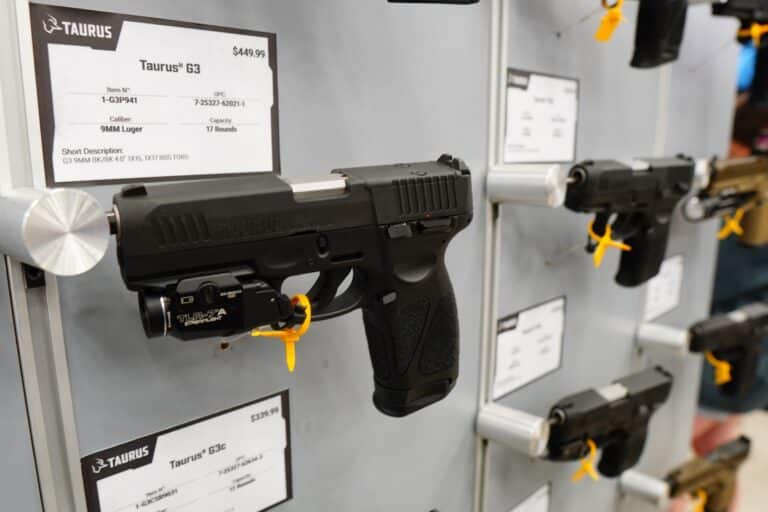The law barring drug users from owning guns is constitutional, according to a new federal court ruling.
Federal District Judge C.J. Williams found an Iowa man’s challenge of the federal prohibition on its face failed. He ruled the ban doesn’t conflict with the Second Amendment and that the charge against the man for owning guns while using marijuana could stand. Although the law implicates the defendant’s gun rights, Judge Williams decided it was in line with the American tradition of gun regulations as required by the test handed down by the Supreme Court in 2022’s New York State Rifle and Pistol Association v. Bruen.
“The Court finds that Section 922(g)(3) does not violate the Second Amendment on its face and therefore denies defendant’s motion to dismiss,” Judge Williams, a Donald Trump appointee, wrote last Monday in United States v. Grubb. “In arriving at this conclusion, the Court first finds that Section 922(g)(3) implicates conduct protected by the Second Amendment. Second, the Court concludes that Section 922(g)(3) is consistent with this Nation’s traditional regulation of possession of firearms by criminals.”
Judge Williams’ ruling further complicates the legal landscape on who can be barred from owning guns under the Second Amendment. Federal courts have produced mixed results on whether unlawful drug users can be prohibited from possessing firearms. In April, Judge Kathleen Cardone, a George W. Bush appointee, dismissed a case against an El Paso woman who used marijuana while owning guns after finding the prohibition was unconstitutional. Earlier this month, a Fifth Circuit Court of Appeals panel came to the same conclusion in a case against a Mississippi man convicted of owning guns while using marijuana.
Hunter Biden’s legal predicaments have also brought significant attention to the question. He had agreed to a plea deal with federal prosecutors, which would have seen him avoid jail time by pleading guilty to two tax crimes and entering a pre-trial diversion program instead of facing a felony charge over owning a gun while using crack cocaine. However, the deal fell apart in July when the judge overseeing it expressed skepticism of some novel aspects, and the two sides couldn’t reconcile the differences she pointed out.
Despite his son’s situation, President Joe Biden’s administration has remained committed to enforcing the gun ban for drug users, including those who smoke weed. In June, his administration warned people that smoking marijuana while owning guns could still lead to prosecution after Minnesota decriminalized the drug.
Judges have also come down on different sides when it comes to whether the Second Amendment protects non-violent felons, people subject to felony indictment, and those under a domestic violence restraining order. The Supreme Court is set to decide that last question in United States v. Rahimi, which is set to be argued in its next term. Further splits may incentivize the High Court to take up more cases on the unsettled question of who can and can’t own a firearm.
Judge Williams started his opinion by arguing the defendant was entitled to Second Amendment protections.
“Under Bruen, the threshold question a court must address is whether the statute in question regulates conduct protected by the Second Amendment. Here, Section 922(g)(3) criminalizes possession of a firearm, which is conduct expressly protected by the Second Amendment,” he wrote. “The text of the Second Amendment does not qualify who may possess firearms, but rather uses the word ‘people.’ Thus, as a textual matter, the plain reading of the Second Amendment covers defendant who is a person under the Constitution.”
But he noted the Eighth Circuit’s decision in 2010’s United States v. Seay, which involved a South Dakota man convicted of using marijuana while owning a gun, found the unlawful drug user gun ban was consistent with the Second Amendment. He said the appeals court would have to overturn that precedent before he could disregard it. Still, he said he would uphold the ban even if Seay were invalidated because it fit the historical tradition of prohibiting people who threaten society from possessing firearms.
“Regardless, even if the Court did not find Seay binding, under the more robust historic analysis demanded by Bruen, the Court is persuaded that Section 922(g)(3) withstands a constitutional attack,” Judge Williams wrote. “Congress made it illegal for unlawful drug users to possess firearms for the common sense and obvious reason that someone using illegal drugs, in possession of a firearm, poses a real danger to the community.”
He also cited 2010’s United States v. Yancey in its finding habitual drug users represent similar threats to society as the mentally ill because they lack self-control.
“It follows, then, that barring unlawful drug users who pose a danger to society is consistent with the history of firearm regulation at the time the Second Amendment was adopted,” he wrote.
Judge Williams concluded the law was constitutional on its face. He noted that other judges had disagreed with his assessment but critiqued them for taking too narrow a view of historical precedents.
“The Court has reviewed these non-binding decisions and, with respect, simply disagrees with the narrow view these courts took of the historic precedent of regulating firearm possession by dangerous and unlawful citizenry,” he wrote. “The Court is persuaded that Section 922(g)(3) is a constitutional restriction consistent with historical tradition.”
However, he left the door open for a different kind of constitutional challenge–one based on how the law was applied to Grubb instead of its overall constitutionality.
“Defendant also challenges Section 922(g)(3) as unconstitutional as-applied to him — a marijuana user — and requests an evidentiary hearing. (Doc. 25-1). Defendant demands an evidentiary hearing on this challenge, but cites no authority for an evidentiary hearing.”
However, he ruled Grubb would have to argue the law was unconstitutional when enforced against him because he used marijuana instead of a harder drug at his trial rather than beforehand.
“Defendant’s remedy lies with trial,” Judge Williams wrote. “If defendant desires to maintain an as-applied challenge to the constitutionality of Section 922(g)(3), then he must await presentation of evidence at trial. Defendant is then free to renew the motion after the complete presentation of evidence at trial. Until that time, the Court must hold its ruling on defendant’s as-applied challenge in abeyance.”






